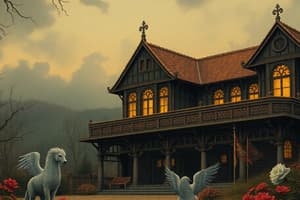Podcast
Questions and Answers
What does Macbeth mean when he says 'the castle's strength will laugh a siege to scorn'?
What does Macbeth mean when he says 'the castle's strength will laugh a siege to scorn'?
- Macbeth feels afraid
- The siege will be successful
- The castle is invincible (correct)
- The castle is weak
What happens to Macbeth's rule as a result of his tyranny?
What happens to Macbeth's rule as a result of his tyranny?
His rule is weakened and he loses loyalty from his subjects.
Macbeth has become more human as a result of his reign.
Macbeth has become more human as a result of his reign.
False (B)
Macbeth states he has 'almost forgot the taste of ______'.
Macbeth states he has 'almost forgot the taste of ______'.
What does Macbeth mean by 'Life's but a walking shadow'?
What does Macbeth mean by 'Life's but a walking shadow'?
Flashcards are hidden until you start studying
Study Notes
Macbeth's Hubris and Irony
- Macbeth's assertion that "the castle will laugh a siege to scorn" highlights his arrogance and belief in invincibility.
- His hubris leads to an ironic downfall as prophecies that made him feel untouchable ultimately signify his impending death.
- The emphasis on famine and disease upon his enemies reflects Macbeth's wrath and tyrannical rule.
Tyranny and Loss of Loyalty
- Macbeth laments that his subjects have turned against him, emphasizing his failure as a ruler.
- His desire for tyranny has weakened his kingship, leaving him unable to confront enemies "beard to beard" due to a lack of loyal followers.
- Shakespeare suggests loyalty must be earned through benevolent rule, tied to the Jacobean belief in the divine right of kings.
Dehumanization through Guilt and Paranoia
- Macbeth’s claim of forgetting the "taste of fears" signifies a loss of humanity and emotional detachment.
- His previous sensitivity to fear contrasts sharply with his current emotional numbness, indicating deterioration due to his tyrannical actions.
- The reflection on "direness" being familiar illustrates the extent of his moral decline; he is now desensitized to horror and violence.
Reflection on Life and Meaning
- Macbeth’s soliloquy upon learning of Lady Macbeth's death conveys a deep existential crisis regarding the meaning of life.
- The repetition of "tomorrow" and the notion of life as a "walking shadow" emphasize life's fleeting and purposeless nature.
- His view that life is "a tale told by an idiot" encapsulates the despair and futility he feels, questioning the significance of his ambitions and accomplishments.
Studying That Suits You
Use AI to generate personalized quizzes and flashcards to suit your learning preferences.




